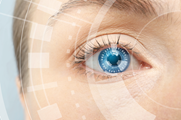The eye is a kind of window to look inside us. From the retinal images of the eyes, thanks to the artificial intelligence of the RetFound system, eye diseases (diabetic retinopathy and glaucoma) can be diagnosed, as well as systemic cardiovascular and neurodegenerative diseases such as heart attack, stroke, heart failure and Parkinson's disease.
These are the technological innovations on which the first episode of the second series of 'Listen and you will see', the podcast of 'L'Oculista Italiano' to promote and support visual wellbeing and learn how to know and protect our eyes.
The use of theartificial intelligence (AI), increasingly complex and sophisticated algorithms, with the analysis of big data, is also revolutionising ophthalmology, opening up new frontiers in the ability to diagnose not only ocular diseases, but also systemic ones. Indeed, the eyes, with their complex vascular and neural networks shared with other organs, offer a unique window on the general health of the body to recognise, for example, degenerative processes due to ageing.
 This brand new science is called Oculomics'. The term, coined in 2020 by Alastair Denniston of the Institute of Inflammation and Ageing in Birmingham (UK), refers to the ability of algorithms to learn from data collected by minimally invasive examinations of the eye to pave the way for deeper and more timely diagnosis of complex systemic diseases not only in the eye. This, which improves diagnosis and treatment with cost reductions, is already a reality.
This brand new science is called Oculomics'. The term, coined in 2020 by Alastair Denniston of the Institute of Inflammation and Ageing in Birmingham (UK), refers to the ability of algorithms to learn from data collected by minimally invasive examinations of the eye to pave the way for deeper and more timely diagnosis of complex systemic diseases not only in the eye. This, which improves diagnosis and treatment with cost reductions, is already a reality.
As the protagonists of the podcast explain, compared to other artificial intelligence systems, RetFound - available free of charge for use by institutions - is particularly efficient. It has, in fact, demonstrated that it can perform significantly better using just 10% of the present data classifications because the system learns to predict the missing portions on its own, speeding up investigation times and the related costs of diagnosis and treatment, since it allows pathologies to be discovered even at an early stage, making it easier and less costly to intervene to improve the patient's condition.
LAi is also important in the treatment of hereditary maculopathies. In these genetic diseases, which affect around 5.5 million people worldwide, there is abnormal development, dysfunction or degeneration of the photoreceptors or retinal pigment epithelium. Ai algorithms are used - as the narrator explains - for the development of therapeutic options based on the replacement of defective genes, such as gene therapy and targeted pharmacological agents, or the correction of mutations. In particular, the Crispr-Cas 9 system makes it possible to look forward to improving the condition of sufferers of diseases such as hereditary maculopathies, thanks to its advanced contribution in the field of gene therapy or defective gene replacement.
Non-gene approaches are also under development, based on neuroprotection e regenerationsuch as stem cell therapy and surgical retinal implants. Artificial intelligence may also change eye surgery with an increasing use of robotic machines. This is the case of robotic cataract surgery using 3D robotic systems. In fact, a prototype robot has been developed that performs cataract surgery using a robotic arm guided by a 3D camera, with very promising results from the first feasibility studies.
Artificial intelligence algorithms also play a role in the development of new antibiotics against resistant eye infections. Hence, with Ai, absolutely unprecedented scenarios are opening up, such as the possibility of screening and eventual diagnosis of eye diseases independently of the operator and with indications for the risk of diseases, including systemic diseases related to ageing, increasingly quickly, with greater precision, thanks to imaging techniques and the collection of large volumes of data in clinical trials.
New treatment approaches are also on the horizon, through surgical robots and new antibiotics, capable of overcoming the problem of antibiotic-resistant infections (MRSA), saving time, costs and improving clinical outcomes. All the more reason to listen to the latest episode on 'Ai e ophthalmologia' published in 'Ascolta e vedrai', the Oculista Italiano podcast available on the platforms - Apple Podcasts, Google Podcasts, Spotify, Spreaker - and on oculistaitaliano.it, where you can also find other in-depth reports and updates.
The next episode will focus on lifestyles and degenerative eye diseases.
To listen to the podcast go to the dedicated section "Listen and you will see" - 1st episode
